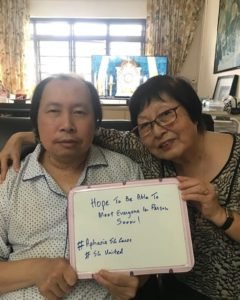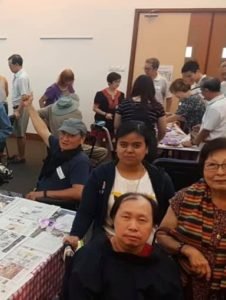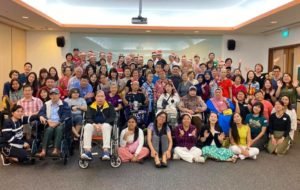When Madam Catherine Yeow laughs, one cannot help but chuckle along with her.
Known for her jovial nature, the 77-year-old grandmother has a positive and easy-going personality that can brighten up the moods of the people around her.
But when a life-threatening disease struck her beloved son, Catherine realised that she needed something more to keep her going as a caregiver while continuing to live the best life for herself.
A Decisive Mind
Like any other day in the office, Mr Damian Yeow goes to work early and usually clocks in overtime at his clerical job in a bank. But on 18 June 2018, Damian, then-51 years old, started displaying odd symptoms that caused alarm to his colleagues.
Catherine shared: “At around 6pm, his colleagues called me and said that they had sent him to Singapore General Hospital (SGH) as he was perspiring profusely and feeling giddy. When I saw him at the hospital, he was awake and even told me not to worry.”
After uttering these comforting words to his mother, Damian’s condition deteriorated, and he had to be transferred to the Intensive Care Unit (ICU). Before Catherine had time to process the sudden change, doctors relayed a stroke diagnosis and pressed her to make decisions for Damian.
Catherine explained: “Whenever the doctors came to talk to me or show me a scan result, I felt fearful. They ran through a list of risk factors and survival rates and said there might be a chance my son could become a vegetable. He had two options – to operate or wait it out.
“In the end, I chose to wait – even today, I am not sure why I picked that choice.”
Questions and Answers
During the next few weeks, left with nothing else to do except pray, Catherine kept vigil outside his ward as her heart constantly ached when she saw her son covered in tubes.
She said: “When the stroke happened, my family was devastated and I found it very difficult to cope. I felt a change in me like I did not care about myself anymore.
“I kept praying and reached out to my neighbourhood prayer group for additional support. I also kept thinking – why must I go through this? I tried to find the reason, but in the end, I just accepted it.”
Luckily, Damian’s condition improved and he was transferred to a community hospital and finally discharged in October 2018.





Taking Charge
Happy to have her son back home, Catherine had to get the house ready to receive a recovering patient and to get his therapy sessions in order.
She shared: “After two knee replacements, I knew that I needed extra help and hired a helper. We also had to de-clutter his room which was full of his huge DVD collection to make the house more accessible for him.”
Catherine also approached different agencies regarding rehabilitation therapy and enrolled Damian in a centre near their home. A year later, however, she noticed little improvement to his physical condition.
“I did some checks and realised the patients were left on their own to exercise and use the equipment. I wanted my son to have more dedicated care, so I got him transferred to another centre,” the retiree said.
Finding New Friends and Respite
Due to his illness, Damian has trouble speaking as he had acquired aphasia, a condition where patients have difficulty formulating or understanding language after a stroke or traumatic brain injury.
He attends one-on-one speech therapy twice a month, and through his speech therapist, the pair found out about Aphasia SG.
A non-profit organisation founded by volunteer speech therapists, Aphasia SG aims to provide opportunities for persons with aphasia and their caregivers to interact and socialise through their flagship “pop-up cafe” programme, Chit Chat Cafe. It also holds community programmes such as Aphasia Choir, virtual gatherings and public outreach events such as movie screenings.
An introvert by nature, Damian was initially not keen to meet other patients. Thus, Catherine put in greater effort in encouraging him to go.
Soon, she realised the sessions were not just beneficial for her son, but for her as well. Catherine shared: “I like the casual cafe setting and I can tell Damian enjoys himself as he interacts with the participants through games and singing.
“As there are many volunteers, the caregivers can leave our charges and have our own sharing sessions and talks on how to cope and learn techniques to relax like breathing exercises.
“Also, we are reminded not to take it to heart when our loved ones have outbursts as it is their frustrations coming out,” she added. Now two years on, Catherine can finally say that she has adjusted to this new life.
“In the beginning, it was terrible as I had to do almost everything myself. I accepted that there are always things beyond our control, and we can keep praying in our own ways to get through them.
“Now, I will give myself a day off, put on some lipstick, and meet my friends for coffee,” she smiled.

